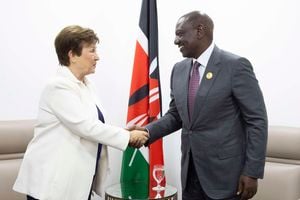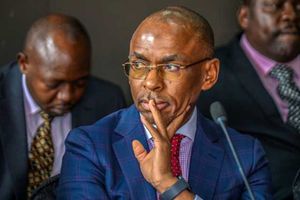Nigeria's triple crises as elections approach

Supporters of the opposition Peoples Democratic Party (PDP) Atiku Abubakar, gather during a party campaign rally in Abeokuta, southwest Nigeria, on January 18, 2023 ahead of February 25 presidential election.
With only three weeks to the general election, Nigeria, Africa’s most populous nation, is literally limping to the ballot.
The West Africa nation is beset with three crises joined at the hip and Africa’s largest economy is staring at a possible grind to a halt.
During the day, most of the country’s 213 million people spend their time queuing at teller machines and bank counters for new currency notes, and at petrol stations for fuel.
When the night comes, they head home, a majority empty-handed, only to be confronted by pitch darkness due to Nigeria’s epileptic electricity supply.
All this while, well-heeled politicians in their swanky cars and helicopters are crisscrossing cities and the countryside, canvassing for votes.

Nigerian currency. Nigeria will start circulating newly redesigned currencies starting December 15, 2022 as President Muhammadu Buhari says there is no going back on the policy.
At least 18 political parties are jostling for presidential and parliamentary votes from a suffering population in the country’s 36 states and the Federal Capital Territory (FCT).
The crises have become major campaign issues, with the ruling All Progressives Congress (APC) grappling with the situation as the opposition capitalises on it in its bid to vanquish President Muhammadu Buhari’s party from power.
While petrol shortages, mainly caused by breakdown of state-run refineries, have remained a concern for years, the situation has become dire in recent months, with motorists spending days and nights on queues at filling stations.
“I usually queue till 12 midnight or even the next day to get fuel. If not, my taxi business will suffer heavy losses,” Ismaila Jimoh, a cab driver, tells Nation.Africa.
Peter Okpe, a manager at TotalEnergies, said queues had become too long because of insufficient and erratic supplies. Nigeria, one of the continent’s biggest oil producers, is a net importer of the product after a majority of state-run refineries were run down.
Buhari’s government has attributed the scarcity to cross-border smuggling, with the Nigerian Midstream and Downstream Petroleum Regulatory Authority (NMDPRA) accusing smugglers of diverting petrol meant for the Nigerian market to neighbouring countries— Benin, Niger, Chad and Cameroon— where the prices are significantly higher.

Motorists queue to buy fuel in Lagos, Nigeria on March 3, 2022.
Abuja, like many African economies, regulates fuel prices to the chagrin of oil dealers who favour free markets.
Poor distribution network across the country, corruption in the system and activities of labour unions, including strikes, have also been cited as contributing factors.
The crisis has spiraled into manufacturing and aviation sectors, with prices of household goods shooting through the roof, and airlines cancelling flights amid steep rises in air ticket prices.
The government has been battling to arrest the deteriorating situation and on January 26, the president constituted a 14-member Steering Committee On Petroleum Products Supply and Distribution Management to find a lasting solution to the crisis.
Meanwhile, the NMDPRA says it is collaborating with the Nigeria Customs Service to address the smuggling menace, with assurances that there are sufficient petrol stocks— more than 1.6 billion litres as of January 26, 2023.
The desperate search for fuel has been compounded by the hunt for new banknotes, hours to the expiration of the deadline for the phasing-out of old Naira notes.
The tension created by the January 31 deadline has forced President Buhari to extend the phase-out of N200, N500 and N1,000 denomination notes to February 10, while the last day for depositing old notes is February 17, 2023.
Both the government and the Central Bank of Nigeria (CBN) say the phase-out of the old currency notes is aimed at mopping up more than 2. 3 trillion Naira that is being held outside the country’s banking system.
Buhari administration says it is also fighting money laundering, corruption and use of dirty cash to influence outcome of the impending election.
Many Automated Teller Machines (ATMs) in major parts of Nigeria are shut because they do not have enough banknotes to dispense, leaving customers stranded.
The situation is further compounded by the fact that local money markets and traders have started to reject the old notes. The new notes became legal tender when they were unveiled by the president on November 23, 2022 in the capital Abuja.
On the instruction of the Central Bank of Nigeria (CBN), commercial banks and other financial institutions have started working weekends to mop up old notes.
Yet, some of the banks are still dispensing old notes against the instruction of the regulator, because according to them, they too do not have enough of the new banknotes to give to customers.
Michael Adejumobi, a software engineer, said the banks were frustrating people by not loading the new notes in ATMs.
“The suffering in this country is too much. Why is the Central Bank of Nigeria (CBN) phasing out old notes without proper provision for people to have the new ones?” he said.
“This is very frustrating. I have been running around banks looking for these new notes because the market women have also started rejecting the old ones.”
The traders ask buyers to pay with new notes or use Point of Sale (PoS) machines at a fee. Happiness Okpara, a PoS operator, said she had no new notes to service her customers.
The shortage continues to bite even as the central bank insists the new notes are lying in its vaults awaiting collection by commercial banks.
Kofo Salam-Alada, CBN’s legal affairs director, told a recent sensitisation meeting in Lagos that they had been calling upon commercial banks to approach its branches across the country to pick up the new notes.
The apex bank, he added, had also relaxed some of the conditions for accessing the new currency notes in order to accommodate the lenders.
“The banks were initially being given slots, but now the CBN is bending backward to accommodate their demands in order to service them so that they can service customers for easy access to the new Naira notes,” he said.
On their part, commercial banks have complained about logistics of delivering the new notes to their branches. To facilitate the pumping of the new notes into the economy, CBN has embarked on a cash swap programme across the states to serve small-scale traders.
“The traders bring their old Naira notes within the range of N10,000, we collect from them and give them the new notes,” said Sunny Daibo, a representative of the CBN.
The official, who expressed displeasure with public’s failure to embrace cashless transactions, declared that there would be no extension of the deadline for depositing old Naira notes.
This has seen restive Nigerians forming long queues at ATMs across the country in anticipation of accessing the new notes.
Angela Akatu, a customer at First Bank Plc, Central Business District, Abuja, said she had stood on the queue for about an hour without collecting the notes.
And after spending hours in the scorching sun in search of money, many Nigerians have been returning to their homes filled with and surrounded by darkness.
Just like fuel, Nigeria is grappling with an acute electricity supply crisis, with businesses and households getting supplies for only a few hours.
Electricity distribution companies have confirmed that there is no enough power to distribute, with Abuja Electricity Distribution Company (AEDC) issuing a statement on the situation in its franchise area.
“This has led to massive load shedding in our franchise area, especially Abuja, the federal capital of Nigeria.’’
Currently, only two out of 16 power generation companies are supplying the national grid. The rest are shut due to breakdowns and other reasons.
Electricity generation has since January 26, 2023 declined from 4,017 Megawatts to 1,892.30 Megawatts, according to the Independent System Operator of the Transmission Company of Nigeria (TCN).
According to the National Bureau of Statistics (NBS), Nigeria requires at least 40,000 Megawatts to satisfy its electricity demand.
These problems appear to be negatively impacting the re-election APC, with the opposition and critics seizing the opportunity to sway voters.
“The government of President Buhari has slept too much on these avoidable problems and his party, APC, cannot accurately defend the ugly situation,’’ Aliero Usman, a rights activist, said in Abuja on Saturday.
“Nigerians are being bogged down by these problems just a month to election. The electorate are fed up with the suffering.’’
Bola Tinubu, APC’s presidential candidate has alleged sabotage. “These problems are created to paint the ruling party in bad light,’’ he said.
Rights activist Bola Akande warned that the elections could be hit by a major voter apathy if the crises are not addressed urgently.






